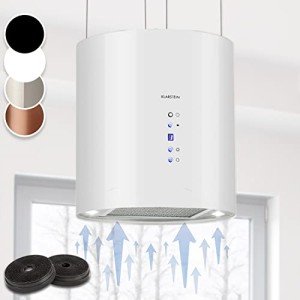Say "Yes" To These 5 Island Cooker Hoods Tips
페이지 정보

본문
The Ultimate Guide to Island Cooker Hoods
Island cooker hoods are essential in modern kitchen style, serving both functional needs and visual preferences. As kitchens progress into social hubs, the importance of efficient ventilation and stylish appliances has actually never been more pronounced. This article will explore the functions, advantages, types, setup factors to consider, and upkeep of island cooker hoods.
What is an Island Cooker Hood?
An island cooker hood is a ventilation system suspended above a kitchen island cooker hoods 60cm cooktop. Unlike wall-mounted hoods, these devices are developed for open layouts where the cooktop is installed on an island, permitting for an unblocked view and an elegant cooking experience. These hoods can efficiently eliminate smoke, odors, and airborne grease, ensuring the kitchen remains fresh and complimentary of pollutants.

Secret Features of Island Cooker Hoods
Island cooker hoods include various functions that enhance their functionality and visual appeal. Below is a thorough list of some common features:
- Suction Power: Measured in cubic feet per minute (CFM), this shows the volume of air the hood can efficiently filter.
- Sound Level: The sound produced by the motor, typically determined in sones or decibels.
- Lighting: Integrated lighting to light up the cooking location listed below.
- Filters: Charcoal or metal filters that can trap grease and smells.
- Ducted or Ductless Options: Ducted hoods vent air outside the home, while ductless hoods filter and recirculate the air back into the kitchen.
- Control Options: Touch controls, remote controls, or smartphone compatibility for kitchen extractor hood Island simple performance.
Benefits of Installing an Island Cooker Hood
Investing in an island cooker hood comes with a plethora of benefits:
- Effective Ventilation: Ensures the kitchen remains smoke and odor-free.
- Visual Appeal: Adds an elegant centerpiece above the kitchen island cooker extractor hood.
- Increased Property Value: A modern-day setup can enhance the general worth of a home.
- Improved Air Quality: Regularly venting out heat and moisture promotes a healthier cooking environment.
Kinds Of Island Cooker Hoods
When selecting an island cooker hood, it's vital to consider the type that best fits the kitchen's requirements. Here's a breakdown of the various types readily available on the market:
Ducted Island Hoods:
- Vents air outside through ducts.
- More efficient in removing grease and smoke.
Ductless Island Hoods:
- Filters air within and recirculates it back into the kitchen.
- Simpler to set up since no ductwork is needed.
Convertible Island Hoods:
- Can operate as either ducted or ductless depending upon the setup requires.
Wall-Mounted Island Hoods:
- Attached to the wall rather of hanging straight over the island.
Chimney Style Island Hoods:
- Feature a chimney-like structure and provide high suction power.
Installation Considerations
Installing an island cooker hood requires cautious preparation and execution. Here are some important considerations:
- Height: The hood needs to be installed a minimum of 30 to 36 inches above the cooktop for optimal performance and safety.
- Ductwork: For ducted hoods, make sure correct ducting and venting work to prevent any air leaks.
- Electrical Requirements: Check regional structure codes for any circuitry and electrical installation guidelines.
- Area: Measure the kitchen island area to choose the properly sized hood.
Upkeep Tips for Island Cooker Hoods
Routine maintenance of island cooker hoods is important for ensuring their effectiveness and longevity. Here are some maintenance ideas:
- Clean Filters Regularly: Depending on usage, tidy or change filters every 1 to 3 months.
- Wipe the Surface: Clean the outside and interior of the hood with moderate cleaning agents to prevent grease buildup.
- Look for Blockages: Ensure that ducts are clear of blockages.
- Service the Motor: Periodically inspect the motor and demand professional servicing if any unusual noises are detected.
Often Asked Questions (FAQs)
1. Just how much CFM does an island cooker hood need?
The CFM requirement typically depends upon the size of the cooktop and the cooking style. As a basic guideline, strategy for 100 CFM for every 12 inches of cooking surface.
2. Can I set up a ductless island cooker hood if I have inadequate ductwork?
Yes, ductless island hoods are an excellent alternative if ductwork is not viable. Guarantee you use high-quality carbon filters for reliable smell and grease removal.
3. How do I understand if my island extractor fans cooker hood is effectively installed?
Validate that there is no excessive noise, the easy work, and the hood effectively removes smoke and odors when in operation, showing correct setup and functionality.
4. How often should I clean my island cooker hood?
Requirement practice suggests cleaning the filters monthly and carrying out a much deeper tidy of the outside and interior every three to six months.
5. Exist energy-efficient alternatives readily available for island cooker hoods?
Yes, there are energy-efficient island kitchen Extractor hood island cooker hoods that use innovative technology to minimize energy usage while maintaining strong ventilation capabilities.
Island cooker hoods play a vital function in contemporary cooking areas, using effective ventilation services while improving the kitchen extractor hood island [Learn Additional Here]'s aesthetic appeal. They come in various styles and features, catering to varied needs and choices. With appropriate installation and regular maintenance, these appliances can significantly improve air quality, add to healthier cooking environments, and raise the total look of the kitchen area. By thinking about longevity and functionality, property owners can make educated choices that line up with their cooking habits and kitchen styles.

- 이전글10 Untrue Answers To Common Double Glazing Birmingham Uk Questions: Do You Know The Right Ones? 25.05.11
- 다음글Nirvana wins dismissal of 'Nevermind' album, naked baby's lawsuit 25.05.11
댓글목록
등록된 댓글이 없습니다.
